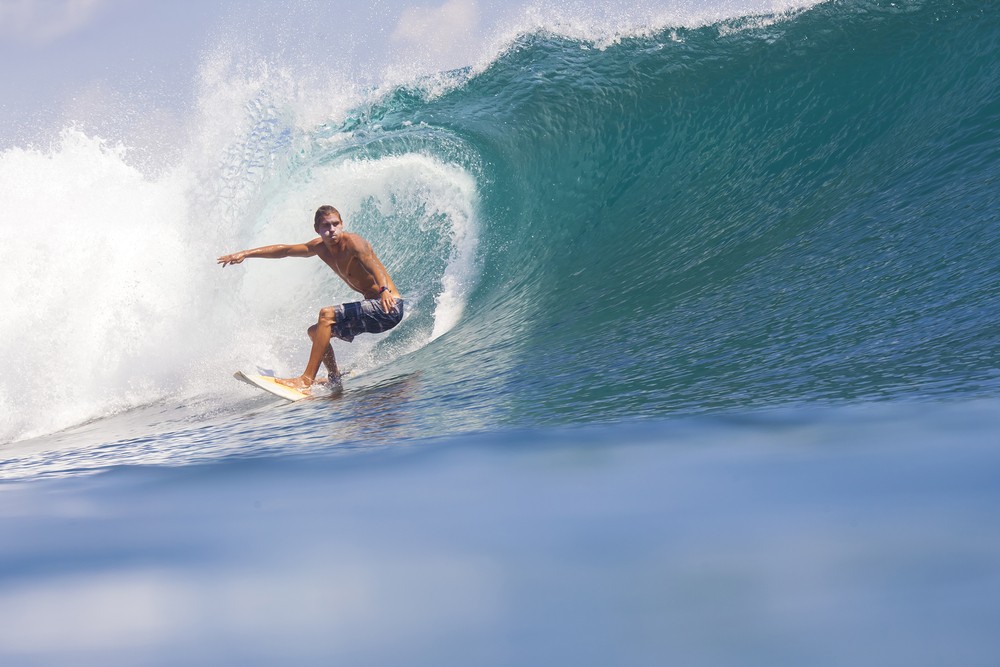Popular Reads
Top Results
Can't find what you're looking for?
View all search resultsPopular Reads
Top Results
Can't find what you're looking for?
View all search resultsSeven ways to prepare for your first surfing experience
Change text size
Gift Premium Articles
to Anyone
Ready for your first surfing experience? Congratulations and welcome to what could turn out to be a lifelong passion.
Before we get started, let me say that you should never, ever try surfing for the first time on your own. You need to take an introductory lesson, go to a surf camp, a surf school or at least be with a more experienced surfer. Also, all surf schools and camps will have the equipment ready for you, which means that you can turn up in your bathing suit for your first lesson. We won’t give you any tips on choosing a wetsuit or a board, because all this will be provided during your first lesson.
Without any further ado, here are seven ways you can prepare for your first surfing experience to make sure that you have the time of your life.
Eat lightly
Usually, surf lessons are held in the morning, and it’s recommended that you eat a light breakfast -- something nutritious that won’t weigh you down. Oatmeal with nuts, some plant or low-fat milk is ideal. Smoothies, juice, toast and bananas are ideal. They will keep you full for several hours and provide you with enough energy to get you through your first surfing lesson.
Avoid eating a fatty breakfast, such as fried eggs, English breakfast or meat. You don’t want anything to come up when you’re on the board in the ocean, and besides, they’re the types of food that make you want to sit down after you eat them, not embark on a strenuous activity.
Stretch, work out, swim
A few weeks before your first surfing lesson, you should do light exercises. Use your muscles and see where you stand and what your fitness level is. Focus on squats, crunches and pull-ups.
A few days before, you should test your swimming skills if you haven’t hit the beach for a while. See how long can you swim for; are you alright with not feeling the ground under your feet? Do you panic if something touches you when you’re in the water?
Finally, right before your session, stretch. Maybe some yoga or just some basic stretching, so that you’re ready to take on a day in the water.
Wear sunscreen
No matter what you’re doing when you’re on the beach, be it reading a book or hitting the waves, you should wear sunscreen. This will help you avoid getting burned and, ultimately, skin cancer. According to SkinCancer.org, about 90 percent of nonmelanoma skin cancers are associated with exposure to ultraviolet (UV) radiation from the sun.
Make sure you select the type of sunscreen that protects against both UVA and UVB rays and that is water resistant, specially formulated for water sports.
Get familiar with the terms
You’re out there for your surfing lesson and your instructor starts throwing words at you that you have no idea what they mean. Make sure you read up beforehand so that you have a rough idea of what is what. Here is a glossary of surfing terms and slang to help you out a bit. Some things are obvious, such as white water, but others not so much.
If you don’t understand something, don’t be afraid to ask your teacher about it, that’s why they’re there.
Listen to the instructor
During your surf camp or surfing lesson, your surfing instructor is the king or queen. Whatever they say goes and nothing else. You should be all ears when they’re talking, respect all the rules they laid down and trust them completely. If you’re uncertain about something, ask. They’ll tell you about surf safety and introduce you to the wonderful world of surfing.
First, all the coaching will be done on land. You will learn how to sit on a board, how to pop up and how to paddle, among other things. Only after will you get the opportunity to hit the water.
Stay close to your pack
No matter how confident you feel after your lesson, don’t stray from your fellow surf campers. A beginner surfer needs their pack. Besides, you could risk getting tangled with the more experienced surfers, which would ruin both your and their experience.
If you have free time on your hands after the lesson, or at the end of the day, and you want to spend it in the water, invite some folks to join you. If nobody can, you should explore your destination and get some rest. Don’t risk going it alone.
Come to terms with the fact that you are a beginner
Nobody gets it right the first time. Nobody gets on a surfboard and starts surfing. You will fall, you will swallow water, you will get tired and feel like quitting. You will feel like you’re the worst student out of the group. That’s fine.
You need to come to terms with the fact that you won’t get things right and once you do, you’ll be on the right path to becoming the surfer you want to be. All you need to do is listen to your instructor, practice and have fun. The rest is just noise.
The last and most important thing you need to remember during your first surfing lesson is to have fun. There’s a famous quote by surfer Phil Edwards that goes, “The best surfer out there is the one having the most fun.”
You’ll fall, you’ll scrape your knees on your board, you’ll be sore the next day, but you’ll also learn new things, make new friends, spend lots of time in the water and in the sun and make memories that will last a lifetime.
Book your spot on a surf camp for beginners at the destination of your dreams and get ready for a surfing adventure of a lifetime. (wng)
***
Cristina is a writer for BookSurfCamps.com, a themed surf website offering a vast collection of surf camps and vacations. She is also a passionate traveler, cat aficionado and novice writer. Find BookSurfCamps at Facebook, Twitter and Instagram.











